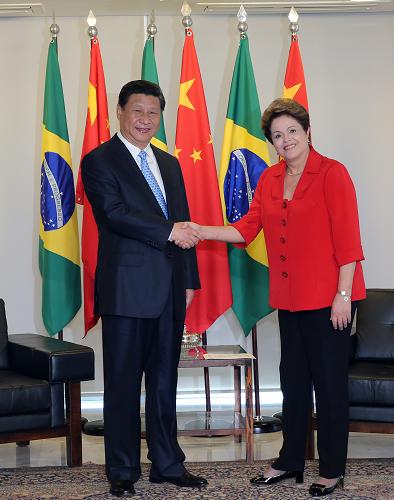Triangulation between China, Latin America and the US?
- By Jiang Shixue
 0 Comment(s)
0 Comment(s) Print
Print E-mail China.org.cn, July 19, 2014
E-mail China.org.cn, July 19, 2014
In April 2006, for the first time in human history, a senior U.S. official, assistant secretary of State for Western Hemisphere, Thomas Shannon, came to Beijing to talk with his Chinese counterpart over China's relations with Latin America. Since then, the bilateral dialogue has been proceeding regularly. Capitol Hill has had several hearings about China-Latin America relations. The U.S. news media has exhibited a keen interest in every movement in bilateral deal of attention to the ties across the Pacific, and quite a few books have been published on this topic.
|
|
|
Chinese President Xi Jinping (L) and his Brazilian counterpart Dilma Rousseff shake hands during their meeting in Brasilia, Brazil, July 17, 2014. [Xinhua/Lan Hongguang] |
U.S. congressmen and journalists are among those who have shown the greatest concern about China's relations with Latin America. Speaking at a hearing before the Subcommittee on the Western Hemisphere of the Committee on International Relations, House of Representatives, on April 6, 2005, Dan Burton, chairman of the subcommittee, said, "I believe China's rising economic, political and military influence in the Western Hemisphere poses serious challenges to the United States in the years ahead, and if we are not careful, Beijing's influence could easily unravel the region's hard-won, United States-backed reforms to fight against corruption and human rights abuses, increase government transparency and combat intellectual property violations, and the democracy that we see as fledgling democracies could be in real jeopardy. We must work in earnest to prevent this from happening." One article in the Wall Street Journal, for instance, says, "The rise of China in the region could complicate U.S. efforts to control illegal immigration, weapons shipments, the drug trade and money laundering, because China is cooperating with Latin countries that are not especially friendly toward those efforts. Some of these nations may try to use the Chinese alternative to challenge U.S. hegemony."
Julia Sweig, director of the Latin America Program at the Council of Foreign Relations in Washington, once said that if President Monroe could see that Latin America's relations with China, Russia and Iran have got so close, he would certainly be rolling over in his grave.
Why is the U.S. alert about China-Latin America relations?
The answer is simple. The United States is concerned about the possibility of losing its traditional sphere of influence in Latin America. Although Secretary of State John Kerry told the Organization of American States in November 2013 that "the era of the Monroe Doctrine is over," there is no concrete proof that the U.S. policy towards Latin America has witnessed any important changes. From congressmen to journalists, the "back-yard" mentality still dominates their view of the China-Latin America relations.
The U.S. concern about China's relations with Latin America is unnecessary.






